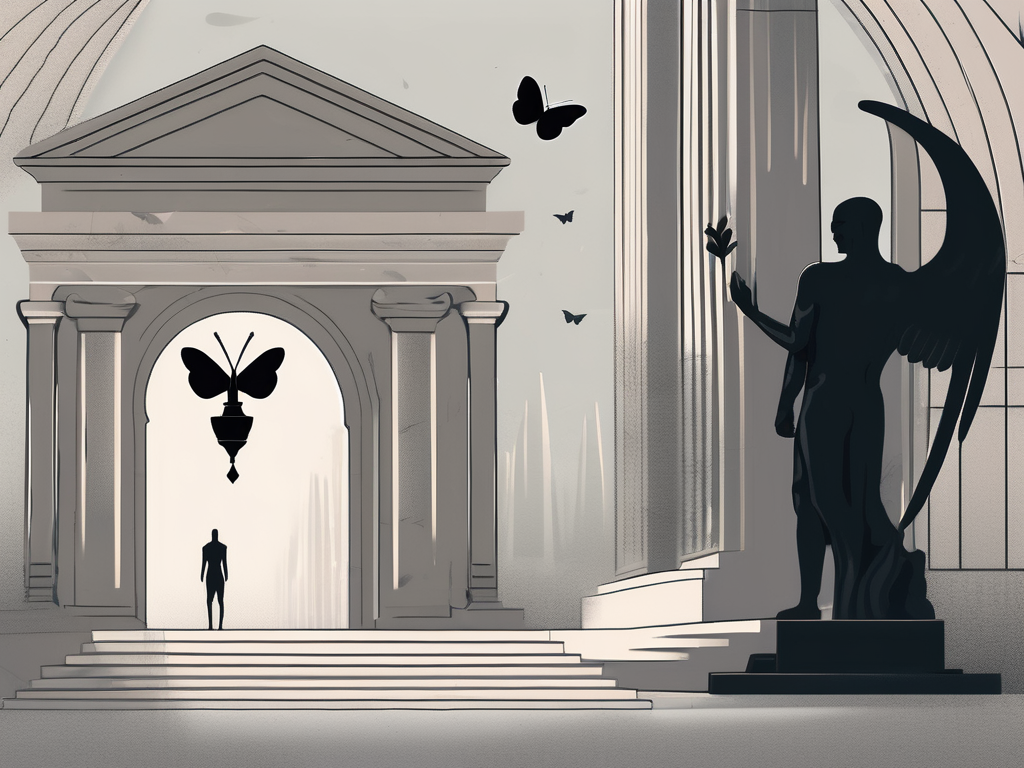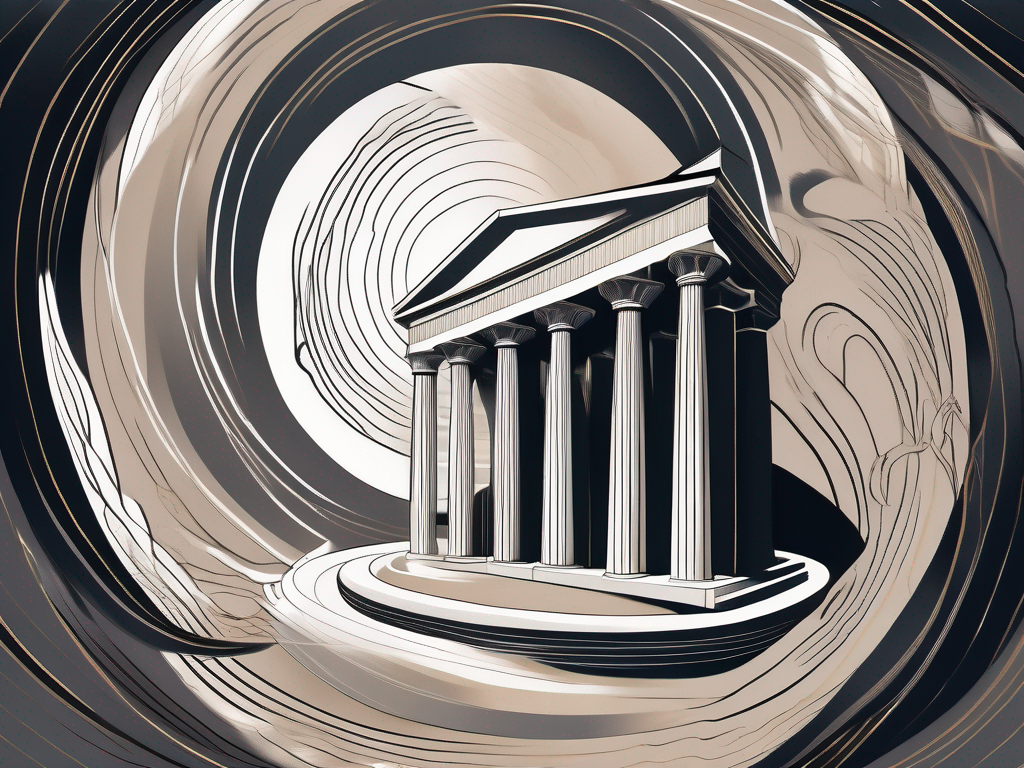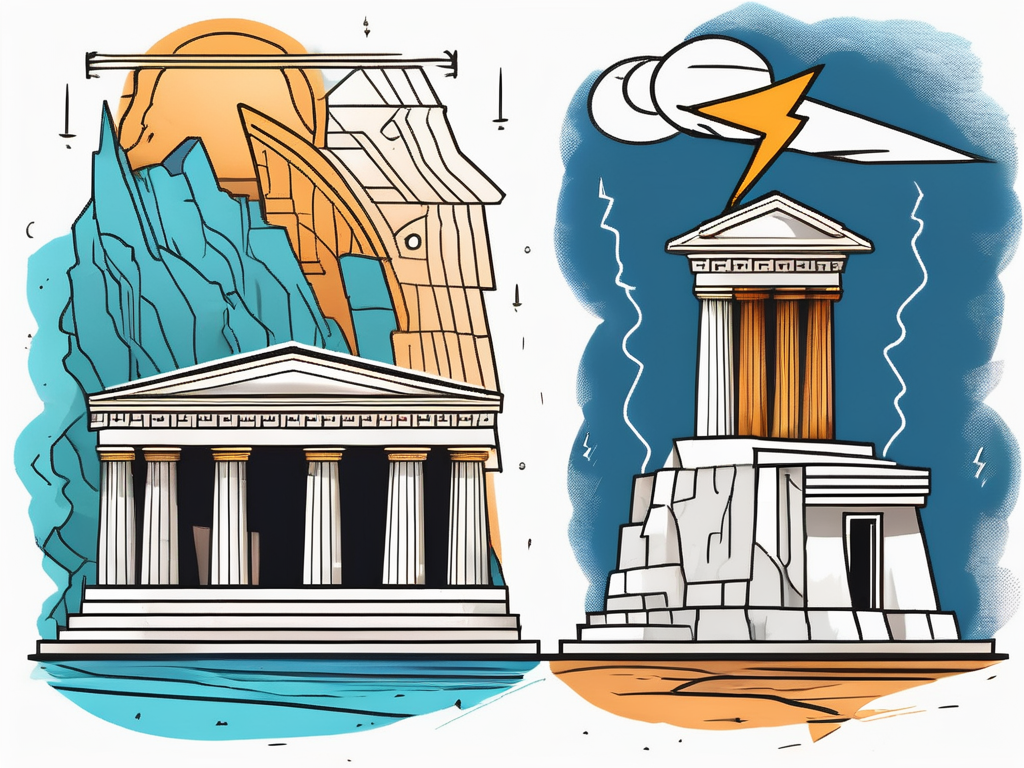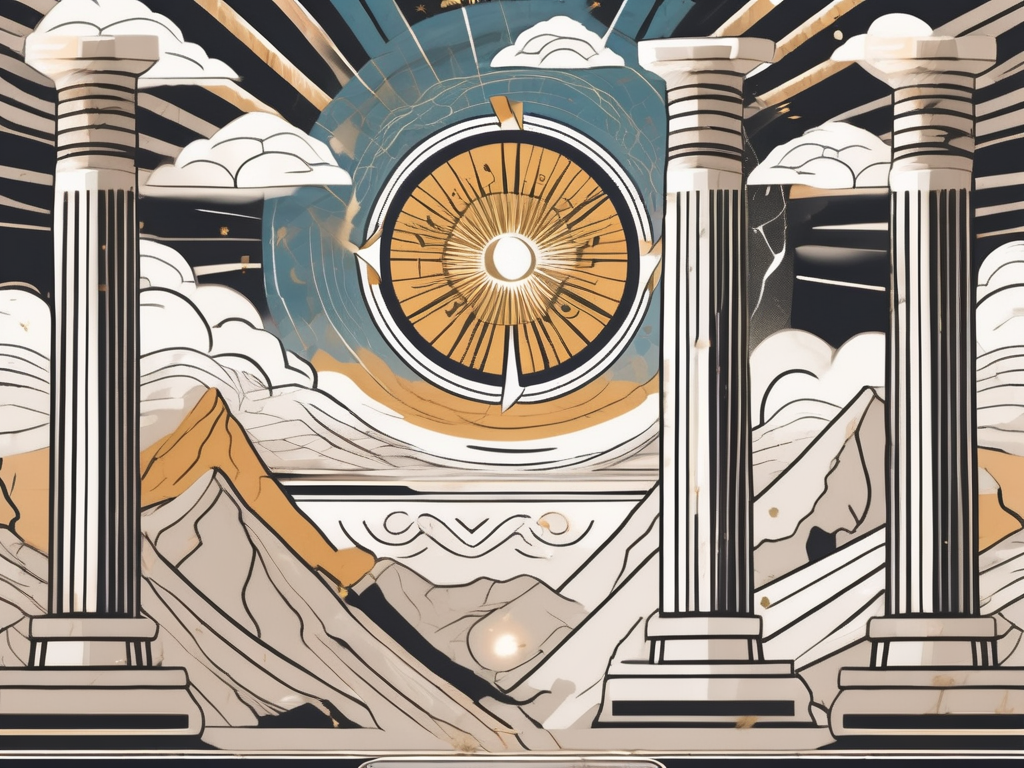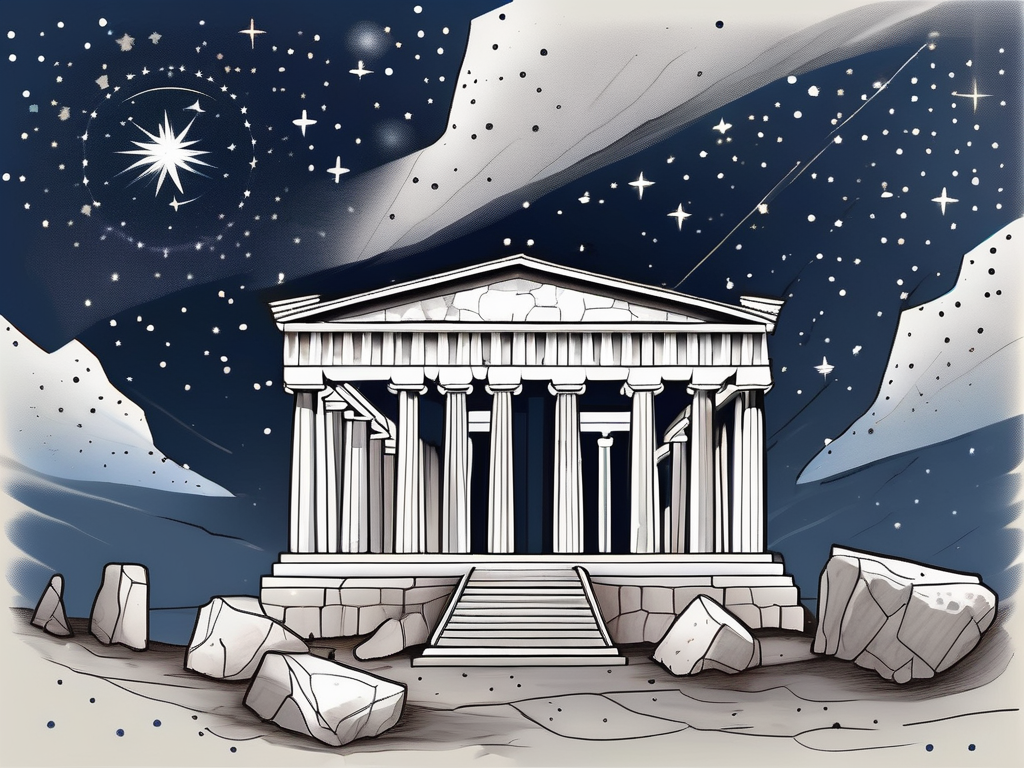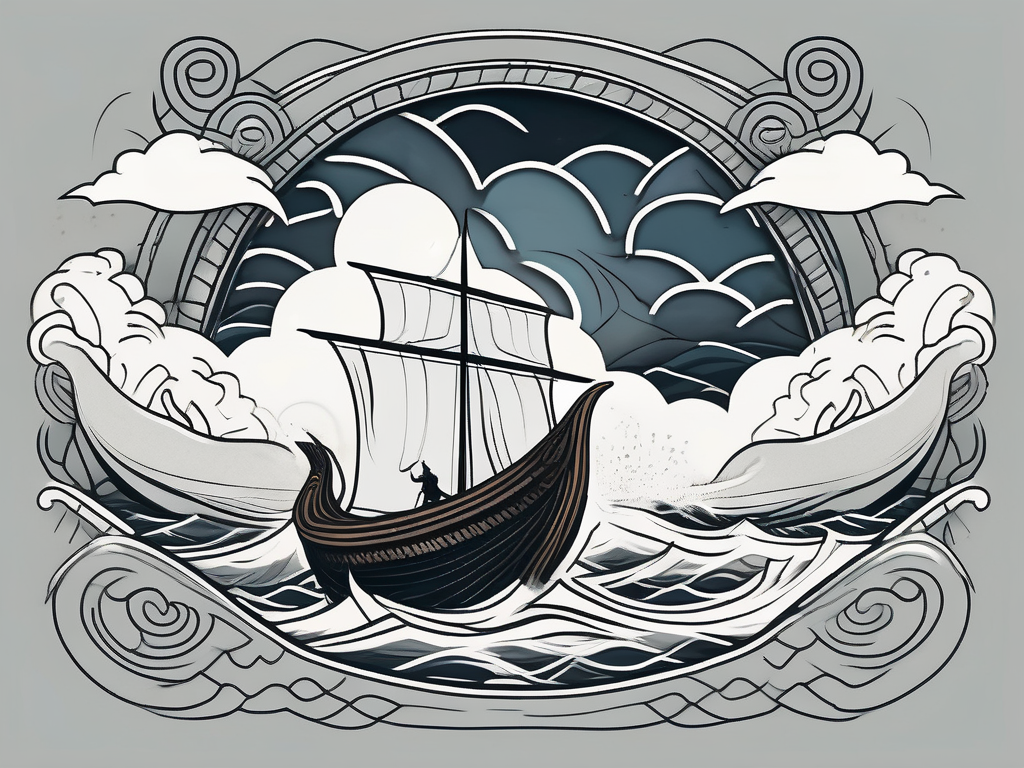Ever since humans began pondering the mysteries of life and death, they have created various mythologies to explain the forces at work in the universe. One such mythological figure is Thanatos, the Greek god of death. In this article, we will delve into the realm of ancient Greek mythology to uncover the intriguing stories and symbolism surrounding the enigmatic figure of Thanatos.
Understanding Thanatos: An Overview
Before we embark on our exploration of Thanatos, let’s gain a basic understanding of who he is and the role he plays in Greek mythology. Thanatos, also known as Morta in Roman mythology, is the personification of death. He is often depicted as a winged young man holding either a torch or an inverted torch, symbolizing the extinguishing of life. This portrayal reflects the Greeks’ belief that death is a journey to the underworld, a realm ruled by Hades.
But what significance does Thanatos hold in Greek mythology? Let’s find out in the next section.
The Role of Thanatos in Greek Mythology
In Greek mythology, death was not viewed as an end but as a natural part of the cycle of life. Thanatos played a crucial role in this cycle by guiding the souls of the deceased to the underworld. He served as a bridge between the mortal realm and the realm of the gods, ensuring that the passing of individuals was honored and acknowledged.
Moreover, Thanatos was believed to be an impartial deity, treating both mortals and gods with the same level of respect in their inevitable journey towards death. This impartiality and his unwavering commitment to his duties made Thanatos a revered figure in Greek mythology.
Join us as we delve deeper into Thanatos’ family and his relations with other gods.
Thanatos’ Family: Relations with Other Gods
In Greek mythology, Thanatos was a member of the divine family tree. He was the son of Nyx, the goddess of night, and Erebus, the embodiment of darkness. Together, they formed the primordial forces that preceded the universe.
Interestingly, Thanatos had a twin brother named Hypnos, the personification of sleep. Mythological tales often portray them as inseparable siblings, as sleep and death are inherently intertwined in the human experience.
Now that we have explored Thanatos’ family connections, let us shift our focus to the symbolism associated with this intriguing deity.
The Symbolism of Thanatos
Thanatos, as the personification of death, carries profound symbolism in Greek mythology. The torch that he holds represents the extinguishing of life, symbolizing the transition from the mortal realm to the realm of the gods. This torch serves as a guiding light for the souls of the deceased, leading them to their final destination in the underworld.
The inverted torch, on the other hand, signifies the end of life and the extinguishing of the mortal flame. It represents the finality of death and the separation of the soul from the physical body.
Furthermore, Thanatos’ wings symbolize his ability to traverse between the mortal realm and the realm of the gods. They represent his role as a bridge between life and death, guiding souls across the threshold and ensuring a smooth transition.
As we continue our exploration of Thanatos, we will uncover more fascinating aspects of this enigmatic deity and his significance in Greek mythology.
The Symbolism of Thanatos
Throughout ancient Greek art and literature, Thanatos is often depicted in various symbolic ways, shedding light on the notions of death and its significance in ancient Greek culture. Let’s uncover some of these depictions in the following paragraphs.
The Depiction of Thanatos in Ancient Art
Ancient artists often portrayed Thanatos as a young, handsome man with delicate wings and a somber expression. This portrayal aimed to capture the inherent contradiction of death – a gentle release from the struggles of life and an unsettling unknown awaiting beyond the mortal realm.
Artworks showcasing Thanatos often featured him escorting souls to the underworld, emphasizing his role as a psychopomp – a guide for the deceased. These artistic representations allowed ancient Greeks to contemplate the nature of life and death, provoking philosophical and existential discussions.
Now, let’s explore the concept of death as understood by the ancient Greeks.
Thanatos and the Concept of Death in Ancient Greece
In ancient Greece, death was not perceived as a finality but as a transition to another realm. Thanatos embodied this understanding, serving not only as the personification of death but also as a symbol of rebirth and renewal. Ancient Greeks believed that through death, individuals would reunite with their ancestors and find eternal peace.
This belief system alleviated the fear associated with death and encouraged individuals to embrace mortality as an integral part of life. Thanatos symbolized the cyclical nature of existence, reminding the ancient Greeks of the impermanence of life and the need to cherish each moment.
Now that we have explored the symbolism associated with Thanatos, let’s turn our attention to his presence in ancient literature.
Thanatos in Ancient Literature
In addition to his appearances in art, Thanatos also found a significant place in ancient Greek literature. Many renowned works incorporated this deity, showcasing the multifaceted nature of death in the Greek imagination.
References to Thanatos in Greek Tragedies
Greek tragedies often explored themes of mortality, fate, and the inevitability of death. Playwrights like Sophocles and Euripides frequently referenced Thanatos to emphasize the fragility of human existence. The presence of this deity brought depth and complexity to the narratives, allowing audiences to contemplate the profound questions surrounding life and death.
Moreover, Thanatos’ appearance in tragic plays not only served as a plot device but also as a reminder of the finitude of life, urging individuals to reflect on their own mortality and the choices they make.
Now, let us shift our focus to the works of the esteemed poet, Homer.
Thanatos in the Works of Homer
Homer, the legendary poet of ancient Greece, beautifully incorporated themes of death and mortality in his epic poems, the Iliad and the Odyssey. Through his vivid descriptions and poetic prowess, Homer shed light on the role of Thanatos, immortalizing him in the annals of Greek literature.
In the Iliad, Thanatos makes several appearances, often as a subordinate of the god Zeus. He is portrayed as a relentless force, ensuring that the gods’ will is executed. Thanatos’ involvement in the grand tapestry of events depicted in the Iliad added depth to the poem, reinforcing the interconnectedness of life and death.
In the Odyssey, Thanatos once again enters the narrative, this time in the form of a character who assists the protagonist, Odysseus, in his quest to return home. The encounter with Thanatos serves as a reminder of the numerous trials and tribulations one must face in the journey of life.
Having delved into Thanatos’ appearances in literature, we now turn our attention to the cult that worshipped this unique deity.
The Cult of Thanatos
Though Thanatos did not have a dedicated cult in ancient Greece, his presence was acknowledged in various religious practices and customs associated with death and funerary rites.
Worship and Rituals Associated with Thanatos
The ancient Greeks held elaborate funeral ceremonies to honor their deceased loved ones. Thanatos’ role as the guide to the afterlife made him an essential figure in these rituals. Families and communities would offer prayers and sacrifices to ensure the safe passage of the departed souls into the underworld, seeking the favor of Thanatos.
Additionally, rituals associated with remembrance, such as the laying of flowers on graves or the establishment of memorials, were performed to honor the memory of the deceased and the inevitable presence of Thanatos in human life.
Now, let’s explore the temples and sacred sites associated with the worship of Thanatos.
Temples and Sacred Sites of Thanatos
While there were no temples exclusively dedicated to Thanatos, ancient Greeks often paid tribute to him at cemeteries and burial grounds. These sacred sites served as spaces for reflection and remembrance, allowing individuals to connect with the divine realm and honor the bond between the living and the deceased.
Moreover, monuments dedicated to fallen soldiers or prominent figures often incorporated symbols associated with Thanatos. These memorials became focal points for communal mourning, reinforcing the timeless presence of death in human lives.
Now, let us explore the influence of Thanatos on modern culture.
Thanatos’ Influence on Modern Culture
Though the worship of Thanatos is no longer prevalent, his influence continues to permeate modern culture in various ways. Let us examine some of these influences in the following paragraphs.
Thanatos in Modern Literature and Film
Thanatos’ enduring presence can be found in modern literature and film, where his symbolism and themes are often explored. Writers and filmmakers draw inspiration from Greek mythology, infusing their works with the complex nature of death and its impact on the human experience.
From novels grappling with mortality to movies delving into the mysteries of the afterlife, the figure of Thanatos emerges as a source of inspiration, provoking thought and contemplation among audiences.
But Thanatos’ influence extends beyond the realm of literature and cinema.
The Psychological Concept of the ‘Thanatos Drive’
In the field of psychology, Thanatos has left an indelible mark through the concept of the ‘Thanatos drive.’ Coined by Sigmund Freud, this term refers to the innate instinct within humans that drives self-destruction and the pursuit of death. Freud believed that alongside the life drive (Eros), our unconscious minds also harbor a death drive (Thanatos), which influences our behaviors and desires.
This concept offers a psychological framework for understanding the complexities of human nature and our eternal fascination with the concept of death.
In conclusion, delving into the realm of ancient Greek mythology allows us to explore fascinating figures such as Thanatos, the god of death. Through his multifaceted symbolism and his role in literature, art, and religious practices, Thanatos invites us to contemplate the mysteries of life and death. Moreover, his enduring presence in modern culture reminds us that the human fascination with death is as timeless as time itself. So let us embrace the enigma of Thanatos and appreciate the intricate tapestry of existence.
